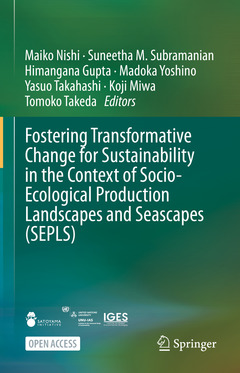Description
Fostering Transformative Change for Sustainability in the Context of Socio-Ecological Production Landscapes and Seascapes (SEPLS), 1st ed. 2021
Coordinators: Nishi Maiko, Subramanian Suneetha M., Gupta Himangana, Yoshino Madoka, Takahashi Yasuo, Miwa Koji, Takeda Tomoko
Language: English
Subjects for Fostering Transformative Change for Sustainability in...:
Publication date: 04-2021
Support: Print on demand
Support: Print on demand
Description
/li>Contents
/li>Biography
/li>Comment
/li>
This open access book is a compilation of case studies that provide useful knowledge and lessons that derive from on-the-ground activities and contribute to policy recommendations, focusing on the relevance of social-ecological production landscapes and seascapes (SEPLS) to ?transformative change.? The concept of ?transformative change? has been gaining more attention to deal with today?s environmental and development problems, whereas both policy and scientific communities have been increasingly calling for transformative change toward sustainable society. The Intergovernmental Science-Policy Platform on Biodiversity and Ecosystem Services (IPBES) has planned to start the so-called ?assessment on transformative change? if approved by the IPBES plenary to be held in 2021. At present, the idea of transformative change, including its scope, methodologies, approaches and strategies, are yet to be clarified. By bringing together all of the different concerns and interests in the land/seascape, SEPLS approaches could provide practical and experience-based insights for understanding and gauging transformative change and identifying determinants of such change. This book explores how SEPLS management relates to the idea of transformative change to further the discussion of sustainable transitions in advancing sustainability science. The introductory chapter is followed by case study chapters offering real-world examples of transformative change as well as a synthesis chapter clarifying the relevance of the case study findings to policy and academic discussions. It will be of interest to scholars, policymakers and professionals in the fields related to sustainable development.
Foreword.- Preface.- Chapter 1. Introduction.- Chapter 2. Reconciling community livelihood needs and biodiversity conservation in Taita Hills forests for improved livelihoods and transformational management of the landscape.- Chapter 3. Degraded landscape transformed into foodland and woodland by village agroforestry.- Chapter 4. Long-term tracking of multiple benefits of participatory forest restoration in marginal cultural landscapes in Himalaya.- Chapter 5. Social-ecological transformation through planting mixed tree species on abandoned agricultural land in the hills of Nepal.- Chapter 6. Transformative change through ecological consumption and production of ancient wheat varieties in Tuscany, Italy.- Chapter 7. Sustainable rural development and water resources management on a hilly landscape: A case study of Gonglaoping community, Taichung, ROC (Chinese Taipei).- Chapter 8. Transformative change in peri-urban SEPLS and green infrastructure strategies: An analysis from the local to the regional scales in Galicia (NW Spain).- Chapter 9. Water with Integrated Local Delivery (WILD) for transformative change in socio-ecological management.- Chapter 10. Traditional landscape appropriation of Afro-descendants and collective titling in the Colombian Pacific region: lessons for a transformative change.- Chapter 11. Climate change resiliency through mangrove conservation: the case of Alitas farmers of Infanta, Philippines.- Chapter 12. Improvement of human and environmental health through waste management in Antigua and Barbuda.- Chapter 13. Synthesis: Conception, approaches and strategies for transformative.
Dr. Maiko Nishi is currently working as a Research Fellow at United Nations University Institute for the Advanced Study of Sustainability (UNU-IAS). She holds a PhD in Urban Planning from Columbia University, City of New York, the United States, an MA in Development Studies from the Institute of Social Studies, the Hague, the Netherlands, and a Mater’s of Engineering from the University of Tokyo, Japan. Her area of research interest includes social-ecological system governance, local and regional planning and agricultural land policy. In particular, her interest lies in multi-level governance, land tenure and use, and subjectivities of institutional actors in governing natural resources.
Dr. Suneetha M Subramanian is currently a visiting fellow with the United Nations University-Institute for the Advanced Study of Sustainability and the Institute for Global Environmental Strategies, Japan. She has more than 15 years of experience in international and sub-national research and capacity building activities relating to biodiversity and human well-being with a specific focus on equity, traditional knowledge, linking policy goals to local priorities and community well-being, assessment of changes to ecosystems and human wellbeing, socio-ecological resilience, and joint implementation of policies and actions on Health and Biodiversity at the community level. She has been involved in various assessments of IPBES as Lead/ Coordinating Lead author and is on the Editorial board of the Sustainability Science Journal and the Journal of Ecosystems and People.
Dr. Himangana Gupta is a JSPS-UNU Postdoctoral Fellow at the United Nations University Institute for the Advanced Study of Sustainability (UNU-IAS) and The University of Tokyo, Japan. She has worked on climate change and biodiversity policy and diplomacy, and is currently working on linkages between biodiversity, climate, and communities in socio-ecological production
This book is open access, which means that you have free and unlimited access. Offers useful knowledge and lessons of SEPLS management to clarify the concept, methodologies, approaches and strategies of “transformative change,” which have been gaining increased attention but are yet to be fully and comprehensively assessed. Provides a synthesis of key messages arising from the case studies, which will help deepen the understanding of relevance to transformative change across diverse stakeholders including policymakers, scientists and practitioners. This in turn will help further the science-policy-practice interfaces related to biodiversity and ecosystem services. Presents a set of real-world examples of transformative change across different regions of the world, which highlight the roles, attitudes and actions of those responsible for SEPLS management in conserving biodiversity while providing other benefits and suggest challenges and opportunities for transformative change. This will help facilitate policy learning and evidence-based decision-making to promote sustainable transitions.
© 2024 LAVOISIER S.A.S.




